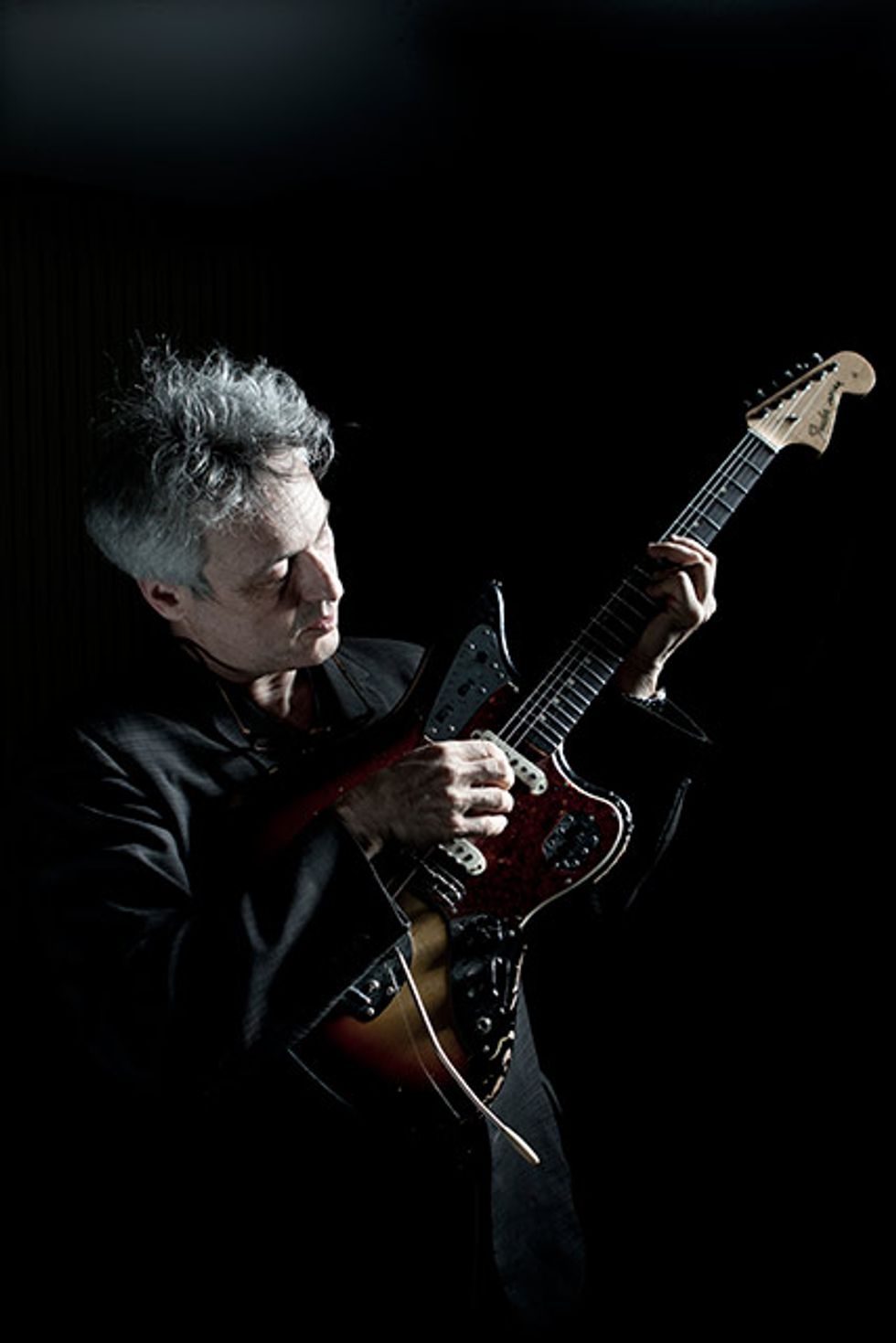
Ribot with the 1963 Jaguar that, plugged into a '60s Deluxe Reverb, handled the bulk of the tones on his new album. Photo by Barbara Rigon.
Three chords and the truth. How many times have you heard that simple formula? Playing in a rock band is simple: Just crank it up and go, right? Well, for avant-garde godfather Marc Ribot, it’s a bit more complicated. “Shortly after 2001, I decided to come out of the closet and do a rock band, dammit,” he remembers. “I thought it would be easy because it was all I did during high school and junior high. I tried a bunch of different musicians and it was interesting, but it wasn’t really working.”
It was on a gig that bassist/electronic alchemist Shahzad Ismaily boldly approached Ribot and offered his services. “He came up to me and said, ‘You know, this could be really good but you have the wrong musicians.’ I asked him who he would suggest and he said, ‘Me and [drummer] Ches Smith,’” Ribot explains. “I’m an agreeable sort of guy—so we started a band.” Thus, Ceramic Dog was formed.
When the group’s first album, Party Intellectuals, was released in 2008, Ribot saw his first taste of success with a straight-up rock band. The trio is raw, powerful, and fluid, mixing influences that range from the West Coast “cool” jazz of Dave Brubeck with the take-no-prisoners approach of an amped-up indie rock band trying to make its mark.
On Your Turn [Northern Spy Records], Ceramic Dog’s latest release, the group embraces its experimental side and adds something that most left-of-center collectives seem to forget—groove. With Smith and Ismaily flowing through everything from light swing (“The Kid is Back!”) to Ramones-inspired punk jams (“Ritual Slaughter”), it’s obvious that their roots run deep. Ribot discusses his inspirations (including some of his No Wave influences), why his bands are sometimes in “disguise,” and how technology has affected his music.
I have to say, you come up with some of the coolest band names.
I'm glad to hear what you said about the name because I was kicking myself, thinking, "Man, I think these names are so obscure and now I'm stuck with them." It's good to hear that someone likes them.
Tell me a little about what lead you to Ceramic Dog?
I have always, for years, been doing projects that are essentially rock bands in disguise. Rootless Cosmopolitans was a rock band disguised as a new music band. Los Cubanos Postizos was really a punk rock band disguised as a Cuban music band. A lot of things I’ve done, even the Albert Ayler project [Spiritual Unity]—because it translates to guitar—is some kind of weird punk-rock band disguised as playing the music of Albert Ayler. Although, it's true that the definitions break down somewhere near that border.
You mentioned that several of your previous projects were actually rock-influenced bands in disguise. Why did you feel the need to disguise them?
Saying "disguised" is a little bit of an exaggeration. In other words, I like approaching things indirectly. For example, if I were a saxophone player, I would have never done the Albert Ayler project. Something interesting happens when you try to translate something. I never think in verbal language or musical language, translation simply does not create the original meaning. It creates a new meaning whether you want to or not. But I want it to. I knew that bringing the Ayler material into guitar was going to change it and also change the guitar. I knew in advance so it wasn't entirely an unconscious thing. I wanted to draw some connections. I knew when I played that material on guitar it was going to mess with some people's assumptions about what "jazz" is as well. People who would only listen to a certain type of punk rock would find themselves being moved by an Albert Ayler composition. It wasn't exactly like I had a dirty secret and was trying to hide it. I knew that was where I came from and there's nothing I could or would want to do about that.
With Ceramic Dog did you find that influences from your more formative years surfaced more so than in your other projects?
I have had a lot of formative years [laughs]. I think I'm still having them, hopefully. Yeah, an important time for me was when I started working with the Lounge Lizards and was listening to a lot of No Wave players and musicians in New York.
Like who?
I was listening to DNA, Arto Lindsey. I mean, I’d studied jazz stuff, but what Arto played seemed to me to be closer to the music I liked than what any jazz guitarist was doing. He was playing complete noise. Fred Frith, James "Blood" Ulmer—just a lot of people. I have to also mention Joe Mars, but he was not a big draw on the No Wave circuit, he was someone I was listening to at the time. Basically, the thing about this project is that we just want to rock the house. A lot of earlier influences too, like the MC5. Bands like that.
The vibe you captured on this album is a group just stashed away in a basement somewhere just banging out these tunes. What were some of the difficulties of making this album?
There are two answers to that question. One, this is the second CD and the second CD for any type of band is usually notoriously difficult. We tried a bunch of different directions and they kinda didn't work and we tried some different technologies before we settled on the right format. Most of this record was recorded in Shahzad's basement/recording/rehearsal space. If it sounds like a bunch of people who got together in a basement, that's what it was. Some of it was recorded at a much more professional studio—Brooklyn Recording. It was difficult as a second record because second records always take time [laughs]. Either that or they suck. Or both. I find that pleasure is kind of like the horizon; it keeps disappearing as you approach it. You have to define it. It's not as tangible as it could seem at first. So yeah, it took a while to find the right language.
As great and meaningful as your influences are, they do change you. Do you feel like when you head back towards more of a "beginner's mind," influences could sometimes be a burden?
Like I say, "It's always revealing." [laughs]. I don't think that you can go back per se. The obstructing angel guards the gate of the Garden of Eden and it guards the way back to high school, too. It's not a simple process to become naive again. In other words, I don't think I could be Arto Lindsay. I never thought I could be Arto Lindsay after I’d already learned how to play music. But, what I could be was someone who was smart enough to understand why Arto's playing was great. I could be someone who valued that. Just because I know how to play all of this stuff doesn't mean I have to be a muso.
When you take the mystery out of the technical side of music, it can be difficult to partition that side of your brain when you go to play a style of music that isn't as technically demanding.
I find a lot of unity in some odd places. I find some correspondences that are surprising between different kinds of music that’ve been constructed as being very different. I found energy in Arsenio Rodr’guez's music that I recall from certain mosh pits at CBGB. I find energy in certain material of Albert Ayler that also feels familiar to me from the best of certain punk-rock moments or certain No Wave moments. It's not accidental that a lot of people on the No Wave scene were into Albert Ayler. He was a jazz musician and I'm sure he was trained in the technique involved in jazz, but that's not what speaks to me in his music. What speaks to me is a certain courage. He had the guts to really go for some big themes and speak in a prophetic voice.
Ribot, and bandmates Ches Smith (drums) and Shahzad Ismaily (bass)
With all of your albums, whether your name is in the group's name or not, I don't really know what to expect. When these tunes came together, were there elements of improvisation built in?
Oh yeah. When we wrote the stuff, some of it was written collectively and it was all played within an improvisatory way and what you hear is one frozen moment of that. Then that becomes a piece and we overdub on it until it sounds like a finished tune. If you hear the band live, that will answer a lot of questions.
How do you plan a live show around this material?
It's not that we've never written a set list. At least once every tour I try to write one but we have never in the history of this band—and probably in the history of all my bands—actually played the set list that I wrote, so there's always a lot of messing around. It's not only in terms of what tune to play next, there's a lot of rearranging the tunes while we’re doing them. A lot of improvising between tunes, during tunes, in spite of tunes. So, yeah, it's how we look at what we do.
Do you have a stockpile of riffs that you are messing around with to bring into sessions or are these tunes evolved out of jams?
It happens all different ways. Sometimes, I bring in an idea. Shazad is always coming up with riffs and things like that. Ches sometimes brings in tunes. For example, on this album, "Ritual Slaughter" and "Your Turn" both basically came out of jams that we had in rehearsals.
The solo on "Your Turn" had a really gritty sound. What did you use for that?
I was using an Analogman King of Tone pedal. That's pretty much all I use other than a volume pedal. I also used one of those Union Tube and Transistor More pedals and an old Memory Man delay.
When you discover a new sound or tone, does it inspire your songwriting?
Definitely, yeah. Sometimes I write at home with a really small amp. For a while, I was using headphones and one of those Line 6 amp simulators. I could pretend that I was in a big arena without upsetting my neighbors
Does imagining you are in a big arena bring out something in your playing?
It's good for change when you‘ve been doing nothing but acoustic guitar for three weeks. You might write some interesting stuff. Then it gets boring. To be honest with you, I put myself in a kind of claustrophobic, but resonant, room. Like a small, packed rock club with an overdriven Deluxe-type amp sound. But every now and then it's nice to be like a rock star in your mind with one of those amp simulators. I'm all about cheap thrills.
What guitar did you use for these sessions?
Most of the guitar on this album was a 1963 Jaguar. Sometimes I used a Tele that didn't even belong to me, it was just hanging around the studio.
Were you using an old Deluxe?
Yeah, mostly a '60s Deluxe. I was borrowing an amp that was at the studio. It looked liked it was from the ’60s. Mine is a 60s-style with alnicos.
Would you describe yourself as adventurous when it comes to discovering new gear?
There was a certain moment at which all kinds of new effects were coming out and it was thought that guitarists need them all.
Marc Ribot's Gear
Guitars
1963 Fender Jaguar
Amps
1960s Fender Deluxe Reverb
Effects
Union Tube and Transistor More, Electro-Harmonix Memory Man, Analogman King of Tone, Hilton Standard volume pedal
Strings, Picks, and Accessories
D’Addario .011s, Planet Waves cables
I think we might still be in that moment.
Well, I never saw a fuzz box that I didn't like. They're all good for something. I still get excited about that. The idea of noise entered the vocabulary of rock bands—a lot of textural effects. For a while, no one knew whose job it was to make those sounds happen. Eventually, there was a division of labor and people realized, "We really don't need keyboard players, we're a rock band!" Zep didn't have a keyboard player and neither did the Yardbirds, but let’s make that guy play all the weird noises. So in other words, the guy who was playing keyboards. The sampler player became a role and there started to be people who were really good at sound textures. When I worked with T-Bone Burnett's recording projects, that guy was Keefus Ciancia. The first guy I knew who was doing that was Mark De Gli Antoni [Soul Coughing]. It became differentiated as a keyboardist function, so I felt if you are going to do that stuff, you have to do it all the way.
Who do you feel is fulfilling that role today?
Nels Cline is an example of a guitarist who is not lazy in that way. He not only buys the stuff, but it's really a part of his language. He stays fluent and masters using his effects in a way that he can play with them very fluently. In order to do that you have to be very energetic and committed to staying near the cutting edge. What I really don't dig is when I see someone doing a solo show and they think they are hot shit because they're looping an ostinato bass part. No. That's not it. It's not about that. I would prefer to do a solo performance on acoustic guitar than to do a half-assed use of technology.
Does your preference for acoustic guitar develop out of the connection between your hands and the sound?
It's because I'm an extremist. First of all, when I play a solo show I like to strip it down because I like the idea of restraints and limits. I think that those are interesting, so I would rather do it totally stripped down than do it half-assed. It's not that I am anti-technology. I mean the funny thing is that on my last solo record, which was Silent Movies, if one listens closely, I had Keefus Ciancia do these sonic environments in where he was using a number of technologies. He was using an enormous sound library arrived at through a very sophisticated blend of digital and analog sound sources. It's not that I am anti-technology at all—I'm just lazy.
Tell about the story behind "Lies My Body Told Me?"
The record, as a whole, is kind of a protest record. It's a political, social, and biological protest record. So that song was a protest against my body. I'm still waiting to hear back from it to see if the protest was successful [laughs]. The idea came from a line in a W.H. Auden poem: The error bred into the bone but not to be loved but loved alone. That's really what inspired that.
It seems like "Masters of the Internet" was aimed at a pretty obvious group.
Yes. Nobody wants to piss off the fans or be the subject of a boycott or have your website shut down. Musicians only express their rage to one another, usually. I had the lack of good taste to put it on the record.
Was your version of "Take Five" intended as a tribute to Brubeck?
I need to tell you something about the timeline of this. We had the idea of covering that tune, recorded it, and mastered it—it took a long time for this record to come out. Well, before we knew that Dave Brubeck was even thinking about dying. Maybe we would have included it on the record anyways, but it was not done in an awareness that Mr. Brubeck was ill or had died. The decision was made before. That tune came out of "we play the way we play" for a lot of reasons—usually when we wind up touring in Europe, we get booked at a lot of jazz festivals. I guess because of my previous history. We are always sitting there doing this rock-oriented thing at a jazz festival and at one point I figured let's do a fucking jazz tune. We thought of the most "jazzy" jazz tune we could think of and that was it. We played it the way we played it. We have a moronic approach to everything, so we approached it that way. I didn't like the complicated changes on the bridge, so I didn't use them.



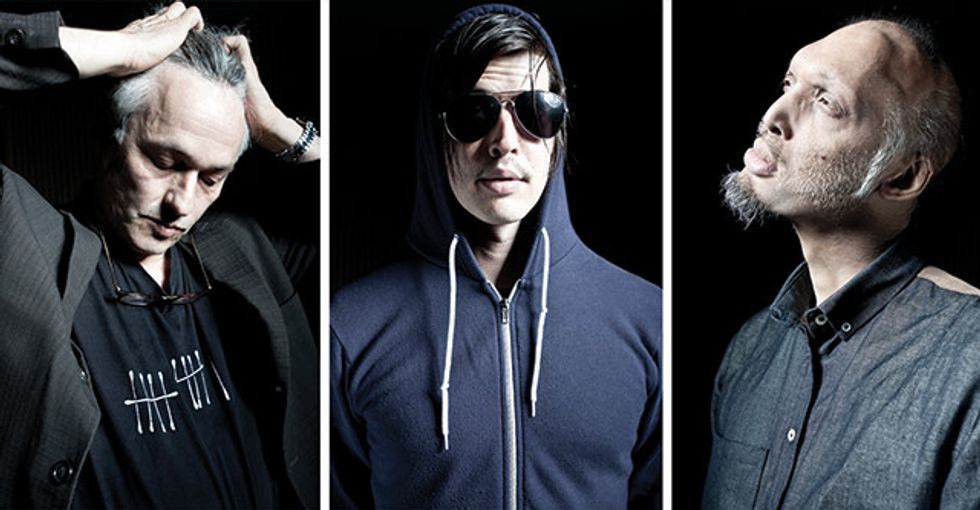





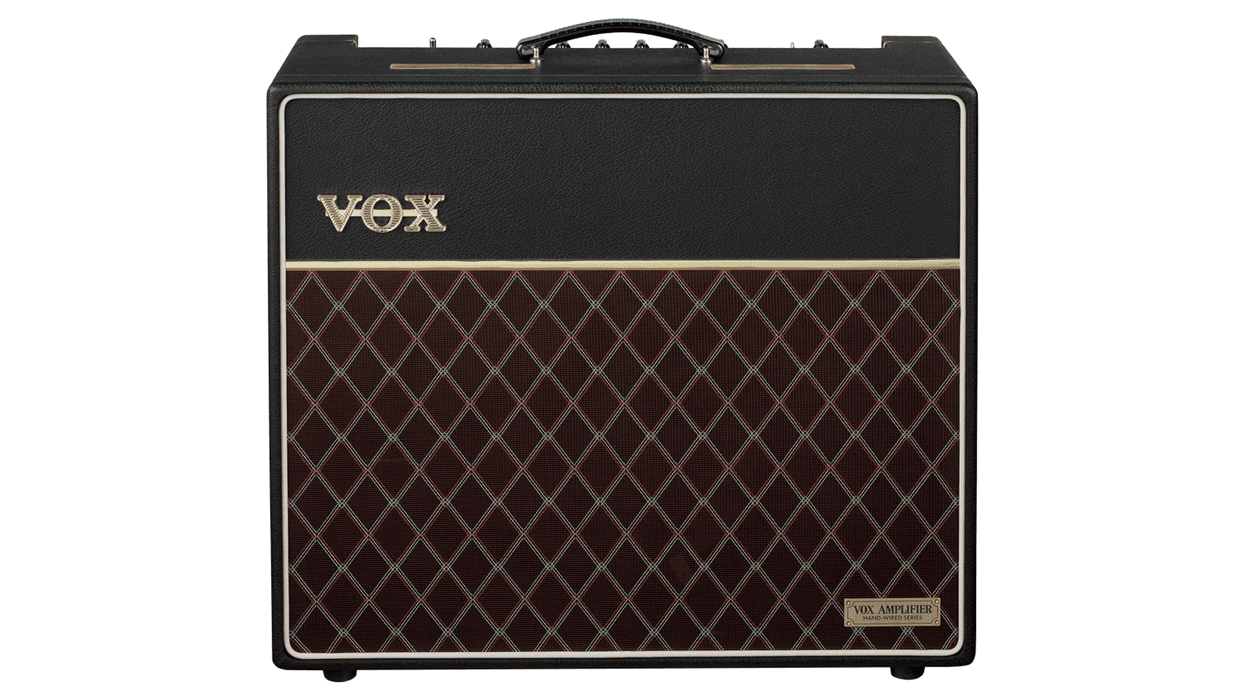

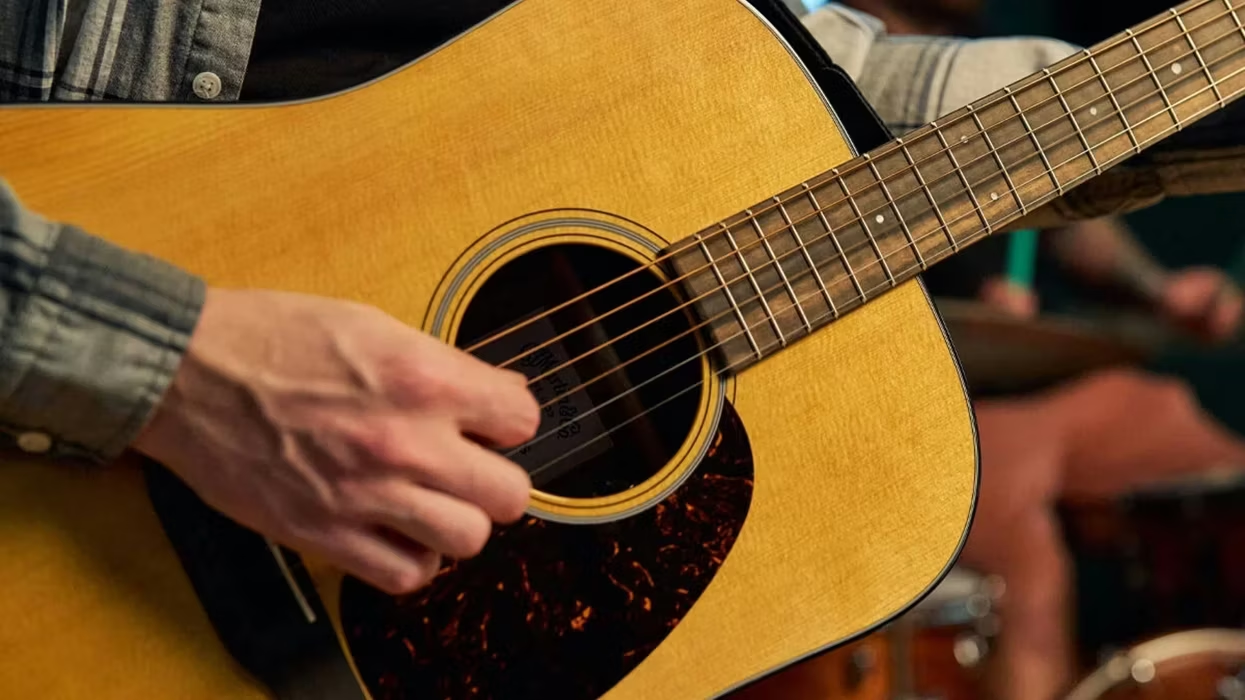
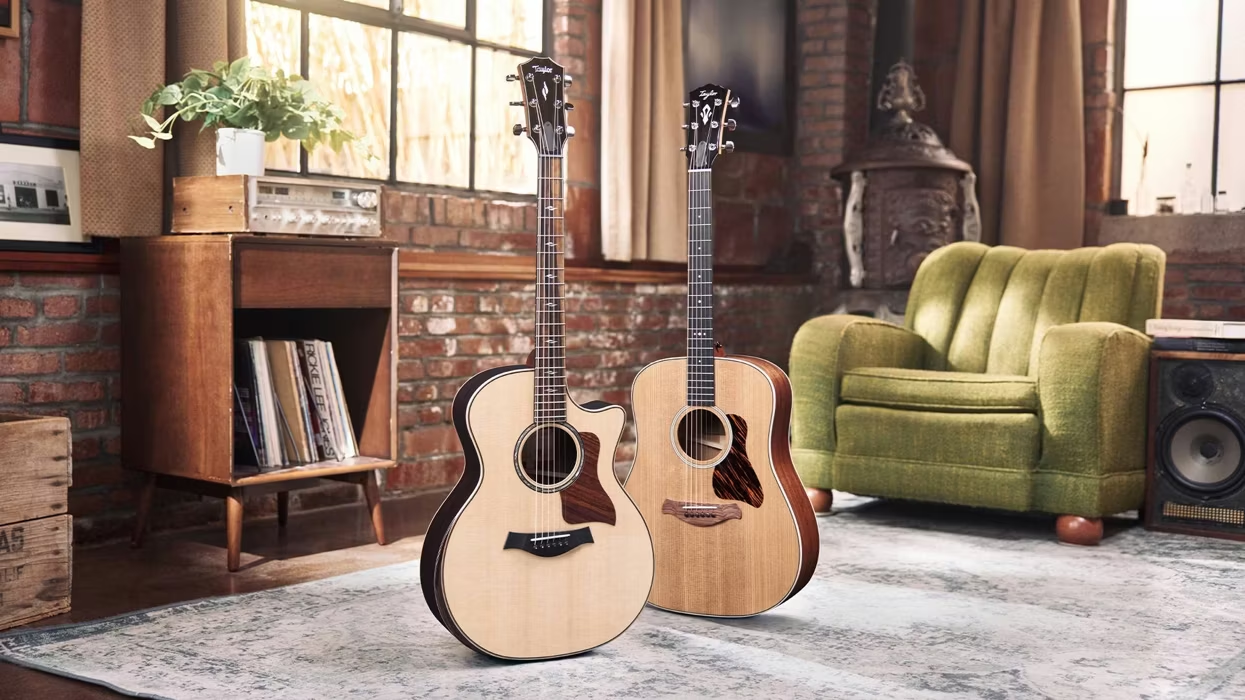
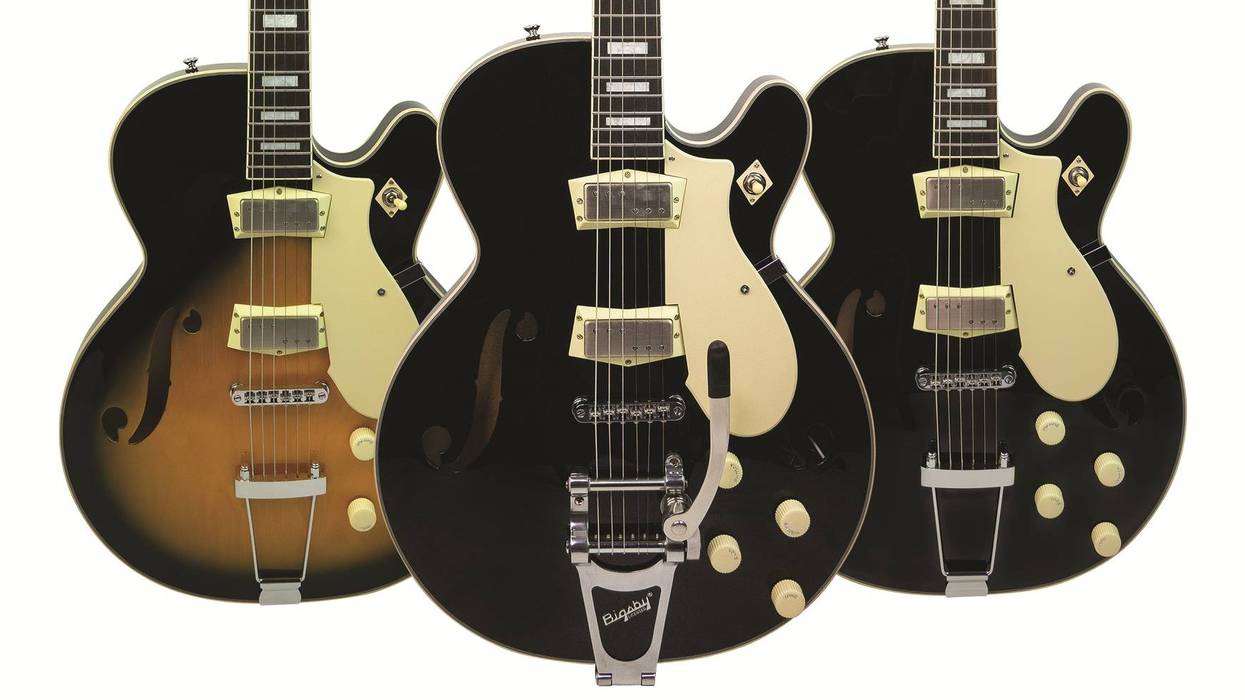

![Rig Rundown: Russian Circles’ Mike Sullivan [2025]](https://www.premierguitar.com/media-library/youtube.jpg?id=62303631&width=1245&height=700&quality=70&coordinates=0%2C0%2C0%2C0)
















![Rig Rundown: AFI [2025]](https://www.premierguitar.com/media-library/youtube.jpg?id=62064741&width=1245&height=700&quality=70&coordinates=0%2C0%2C0%2C0)




















 Zach loves his Sovtek Mig 60 head, which he plays through a cab he built himself at a pipe-organ shop in Denver. Every glue joint is lined with thin leather for maximum air tightness, and it’s stocked with Celestion G12M Greenback speakers.
Zach loves his Sovtek Mig 60 head, which he plays through a cab he built himself at a pipe-organ shop in Denver. Every glue joint is lined with thin leather for maximum air tightness, and it’s stocked with Celestion G12M Greenback speakers.






